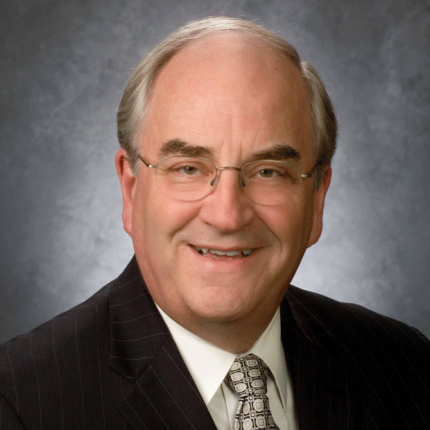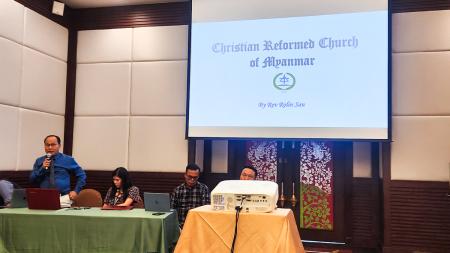Boot Reflects on Years as Executive Director

Rev. Joel R. Boot says a crisis in the church in which he played no role and knew little about brought him to Synod 2011, which met that year on the campus of Calvin College.
Although he had been to synod many times over the years, this time he sat at the head table of the church’s annual business meeting as the executive director of the denomination.
In fact, Synod 2011 ratified the action of the CRC’s Board of Trustees that appointed him to fill the position left vacant by the resignation of the previous executive director.
“As I sat at that head table, I was scared out of my wits and did not know what to expect,” said Boot. “Since then, the organization has made its way under my skin and into my life.”
Boot will retire on May 1 after serving as executive director and then, since last summer, as director of ministries and administration.
“The closer I get to retirement, the more reticent I get because I realize how important this church is to me and how much I have loved serving in these positions,” he said.
Boot was named to his current position when Dr. Steve Timmermans was appointed the new executive director at Synod 2014.
Colin Watson, Sr., who has extensive experience in a range of CRC leadership positions, was recently appointed by the BOT to serve as director of ministries and administration.
“I’m not sure what I will do when I leave, but I know that I want to serve the church in some capacity—however the Lord leads and the church allows,” said Boot.
Before coming to serve as executive director, Boot was pastor of Ridgewood CRC in Jenison, Mich. Before that, he served three other churches.
As he reflects on his tenure, Boot says he is grateful to have been an integral part in helping the church to address challenges and to adapt to change.
In fact, Synod 2011 right away made him the first member of the CRC’s Task Force Reviewing Structure and Culture, giving the group the mandate “to conduct a review of the organization, structure, and leadership within the CRCNA.”
That group is to present its final report to synod this year and will suggest changes to the composition of denominational boards. It will also suggest further study on ways in which classes and synod might function better, said Boot.
He also has played a significant role in leading a group reviewing and expanding diversity in leadership in the CRC; has chaired the committee searching for an interim editor of The Banner, and has led the effort to establish collaborative work groups among CRC employees.
In addition, Boot has been an important part of ongoing discussions regarding relations between the CRC in the U.S. and Canada.
Also during this time he has seen a great deal of change in top offices of the CRC with the hiring of new directors for Christian Reformed Home Missions and Back to God Ministries International.
A new Canadian Ministries director has also been hired, and the search for the new executive director was launched and completed.
In addition, new presidents of Calvin College and Calvin Theological Seminary were hired.
“This all transpired in the past four years,” he said. “There has been a sea change in personnel.”
But there is more. An effort is under way to create a new ministry plan for the CRC, and, he said, there has been the move to build a closer relationship between the CRC and the Reformed Church in America.
Last year, Synod 2014 decided to enter into an agreement calling on the CRC and RCA to work together whenever and wherever possible except in instances in which “deep differences of conviction” dictate they do otherwise.
“This is a huge thing,” Boot said. “I’m delighted to have come into the position at a time when it was decided that we ought to do more to bring us closer together.”
This is also a time in which there seems to be a growing awareness of the need for “a more vibrant, enfleshed ecumenicity” among many denominations, Boot said.
He says relations between the CRC and the Evangelical Presbyterian Church in Egypt (Synod of the Nile) is an example.
Although they recently signed an ecclesiastical fellowship agreement, Boot says he would like to see the two churches consider even more ways in which they can build a closer relationship.
“We want to have something that is more than sending someone to Cairo, having them send someone to the CRC synod, and exchanging minutes,” said Boot, who has traveled to Egypt twice.
“The question is ‘How do we build a closer relationship between the churches so that we can find ways to reach out and embrace one another more closely to help and benefit one another?’”
Besides going to Egypt, Boot has had the opportunity to travel to South Africa, Indonesia, South Korea, and China over the past four years, and he says, “My life has certainly been enriched by my brothers and sisters in those countries.”
Closer to home, Boot says he is excited by the effort that Christian Reformed Home Missions and Christian Reformed World Missions is exploring to find ways that might bring their agencies together into one ministry with a unified mandate for missions.
There may no longer be a need to separate the work of Home Missions and World Missions, since so much of the world “is right here in our communities,” he says.
Similarly, says Boot, he sees a growing interest in countries around the world to receive the strong, Reformed faith that the CRC has to bring. “There are all kinds of implications for this,” he said.
Boot adds that he finds it significant that the requirements to serve in the CRC’s top posts have changed.
Neither Timmermans nor Watson were required to be ordained prior to stepping into their positions.
Watson has a strong background in business, along with serving as an executive minister of Madison Avenue CRC in Paterson, N.J.
While Timmermans, a psychologist and former college president, is seeking to become a commissioned pastor, the reality is that hiring both him and Watson was a break with tradition, says Boot.
“This is the first time in my memory that the church is regularly talking about doing things such as this that have not been tried before,” Boot said.
This sense of being willing to experiment, coupled with the church’s historic commitment to its confessions and its ongoing mandate for ministry, make him “feel hopeful and excited about the future of the CRCNA,” says Boot.


